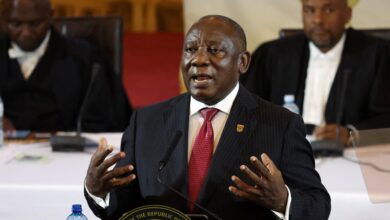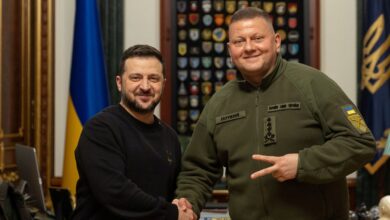
The Nordic country’s new president will lead Finland as a NATO member amid tensions with Russia.
People in Finland are heading to the polls to elect a new president to lead the country in its new role within NATO after it broke with decades of non-alignment to join the Western defence alliance in the wake of Russia’s invasion of Ukraine.
All nine candidates are promising a tough stance towards Russia if elected president, a role that entails taking the lead on foreign and security policy in close cooperation with the government, representing the country at NATO meetings, and also acting as commander-in-chief of the Finnish Defence Forces.
The centre-right National Coalition’s Alexander Stubb has emerged as the frontrunner, with recent polls giving him 22-27 percent support in a first round, just ahead of liberal Green Party member Pekka Haavisto, who polled at 20-23 percent.
The nationalist Finns Party’s Jussi Halla-aho is not far behind Haavisto, at 15-18 percent.
Bank of Finland Governor Olli Rehn and Social Democratic European Union Commissioner Jutta Urpilainen are also among the other six candidates from across the political spectrum.
Nearly 45 percent of eligible voters, or 1.9 million Finns, voted in advance of Sunday, data from the Ministry of Justice showed. Partial results consisting of advance votes are expected soon after polls close at 8pm (18:00 GMT).
If no one emerges after the first round with more than 50 percent of the votes cast, a run-off election will be held between the first and second candidates on February 11.
War in Ukraine
In Helsinki, one advance voter, 26-year-old Leena Boksha, told the Reuters news agency it was particularly important to vote in the election because of the war in Ukraine and the difficult situation created by it.
Boksha said Stubb, seen by Finns as a cosmopolitan pro-European, was the right person to head the country’s foreign policy at this time.
“I voted Alexander Stubb because I think he’s very good at dealing with other countries and he has a good relationship with people outside Finland,” said Boksha, who was out with her baby to accompany a friend to vote on Sunday.
Jere Markkinen, a 22-year-old student in mechanical engineering, took a different view.
“I don’t think he [Stubb] would be a very good president because he doesn’t seem like he wants to represent the people, he wants to represent himself,” Markkinen told Reuters, adding he had voted for Haavisto in advance.
“He is experienced in foreign politics and is known for generally acting smart, unlike some other candidates.”
Finland’s admission to NATO last year also drew threats of “countermeasures” from its much larger neighbour Russia. In December, Finland closed its entire border with Russia to passenger traffic in response to a surge in migrants trying to cross. Moscow denied Finnish charges it was sending the migrants there.
At a televised press conference on Thursday, Stubb said Finland is in a situation now where “Russia and especially [Russian President] Vladimir Putin is using humans as a weapon.”
“It’s a migrant issue, it’s a ruthless, cynical measure. And in that case, we have to put Finland’s security first,” he added.
Main rival Haavisto stressed that Finland had to “send Russia a very clear message that this can’t go on”.
The new Finnish president will replace 75-year-old incumbent Sauli Niinisto, who is required to step down after two six-year terms in office.
He earned the nickname “the Putin Whisperer” during his tenure for his role in maintaining close ties with Russia, which had long been a key role for Finnish presidents.
Source link




